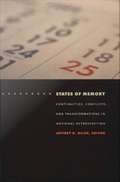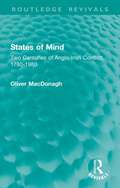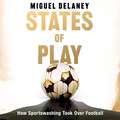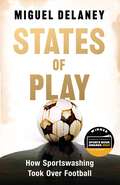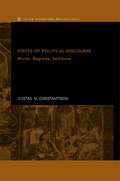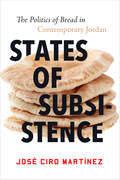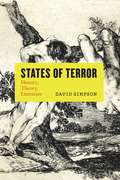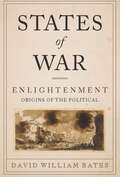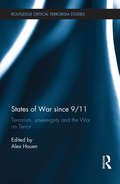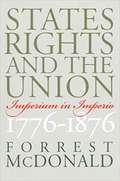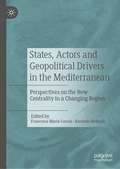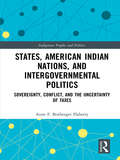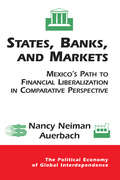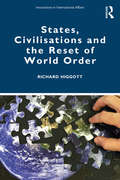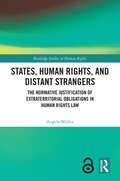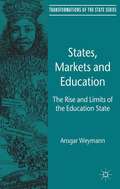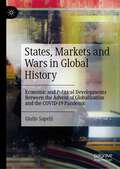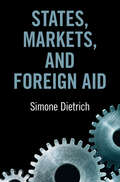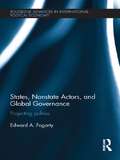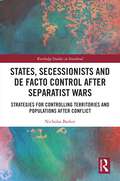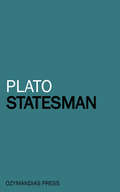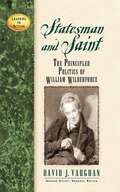- Table View
- List View
States of Memory: Continuities, Conflicts, and Transformations in National Retrospection
by Jeffrey K. OlickStates of Memory illuminates the construction of national memory from a comparative perspective. The essays collected here emphasize that memory itself has a history: not only do particular meanings change, but the very faculty of memory--its place in social relations and the forms it takes--varies over time. Integrating theories of memory and nationalism with case studies, these essays stake a vital middle ground between particular and universal approaches to social memory studies. The contributors--including historians and social scientists--describe societies' struggles to produce and then use ideas of what a "normal" past should look like. They examine claims about the genuineness of revolution (in fascist Italy and communist Russia), of inclusiveness (in the United States and Australia), of innocence (in Germany), and of inevitability (in Israel). Essayists explore the reputation of Confucius among Maoist leaders during China's Cultural Revolution; commemorations of Martin Luther King Jr. in the United States Congress; the "end" of the postwar era in Japan; and how national calendars--in signifying what to remember, celebrate, and mourn--structure national identification. Above all, these essays reveal that memory is never unitary, no matter how hard various powers strive to make it so. States of Memory will appeal to those scholars-in sociology, history, political science, cultural studies, anthropology, and art history-who are interested in collective memory, commemoration, nationalism, and state formation. Contributors. Paloma Aguilar, Frederick C. Corney, Carol Gluck, Matt K. Matsuda, Jeffrey K. Olick, Francesca Polletta, Uri Ram, Barry Schwartz, Lyn Spillman, Charles Tilly, Simonetta Falasca Zamponi, Eviatar Zerubavel, Tong Zhang
States of Mind: Two Centuries of Anglo-Irish Conflict, 1780-1980 (Routledge Revivals)
by Oliver MacDonaghOriginally published in 1983 and slightly revised in 1985, joint winner of the Christopher Ewart-Biggs Memorial Prize, States of Mind is an exploration f the ideas underlying Anglo-Irish conflict over the past two centuries. This is a book about nationalism and colonialism and above all about political ideology. The ideology is popular, to be inferred from behaviour rather than found in treatises. Often it was, and is, expressed in images and slogans. The resultant cross-purposes and double meanings, ambiguity and dualism are characteristic of cultural collision and accommodation generally. This book throws light upon a very wide range of modern history, and not just upon the relations of one particular metropolitan power and its dependency. The definition and treatment of the subject, as well as the conclusions, are strikingly novel.
States of Play: How Sportswashing Took Over Football
by Miguel Delaney'A must-read on how modern football works.' - Ian Wright'In this excellent investigation, Delaney reveals the ugly side of the beautiful game.' - Oliver Bullough'Brave, forensic and utterly gripping.' - Tom Holland'Majestic... the essential guide to how the people's game has become the plaything of the very rich and powerful.' - Jonathan Wilson______________________________The definitive account of how capitalism and the world's elite corrupted modern footballAs the 2022 World Cup in Qatar drew to a close, there was a bitter undercurrent to Argentina's triumph. Throughout the tournament, numerous allegations of sportswashing and financial misconduct had been made against the state of Qatar, moving what had previously been a smaller conversation into the worldwide spotlight. The question had been asked, who really owns and runs football? Journeying from Abu Dhabi to Newcastle, and onto London, Paris, Moscow and New York, journalist Miguel Delaney investigates the allegations of sportswashing and misconduct in the beautiful game. The result is a gripping account of how football has been taken over by the world's wealthiest businessmen, state-backed corporations, media tycoons and oil-rich oligarchs. From Neymar's £198 million transfer to Paris Saint-Germain and Abu Dhabi's construction empire in Manchester to failed Financial Fair Play constraints and the dawn of the European Super League, Miguel draws on exclusive interviews and unprecedented access to key stakeholders to produce an all-encompassing exposé of modern footballs highest echelons.Authoritative, riveting and eye-opening, States of Play reveals how football has become a tool for the world's elite.______________________________'Delaney's diligence and determination to hold authorities to account is the moral compass that the game needs.' - Andy Brassell'The most important football book of its generation.' - Jack Pitt-Brooke'An eye-opening and essential investigation into the forces shaping the world's most popular sport.' - Joshua Robinson & Jonathan Clegg'This book tackles the major issue affecting football today with fearlessness and forensic scrutiny. An important investigation for our times.' - Laurie Whitwell
States of Play: How Sportswashing Took Over Football | The International Bestseller & Winner of the Football Book of the Year Award
by Miguel DelaneyTHE INTERNATIONAL BESTSELLER & WINNER OF THE FOOTBALL BOOK OF THE YEAR AWARD A TIMES SPORTS BOOK OF THE YEARA TELEGRAPH BOOK OF THE YEARAN IRISH TIMES BOOK OF THE YEARAN IRISH INDEPENDENT BOOK OF THE YEAR'Important, perfectly timed and hugely necessary.' The Guardian'Magnificent. Some of the details are eye-popping.' Irish Independent'Football needs this book. A monumental piece of investigative journalism.' Irish Times'A must-read on how modern football works.' Ian Wright'Brave, forensic and utterly gripping.' Tom Holland______________________________The definitive account of how capitalism and the world's elite corrupted modern footballAs the 2022 World Cup in Qatar drew to a close, there was a bitter undercurrent to Argentina's triumph. Throughout the tournament, numerous allegations of sportswashing and financial misconduct had been made against the state of Qatar, moving what had previously been a smaller conversation into the worldwide spotlight. The question had been asked, who really owns and runs football? Journeying from Abu Dhabi to Newcastle, and onto London, Paris, Moscow and New York, journalist Miguel Delaney investigates the allegations of sportswashing and misconduct in the beautiful game. The result is a gripping account of how football has been taken over by the world's wealthiest businessmen, state-backed corporations, media tycoons and oil-rich oligarchs. From Neymar's £198 million transfer to Paris Saint-Germain and Abu Dhabi's construction empire in Manchester to failed Financial Fair Play constraints and the dawn of the European Super League, Miguel draws on exclusive interviews and unprecedented access to key stakeholders to produce an all-encompassing exposé of modern footballs highest echelons.Authoritative, riveting and eye-opening, States of Play reveals how football has become a tool for the world's elite.______________________________'The moral compass that the game needs.' Andy Brassell'In this excellent investigation, Delaney reveals the ugly side of the beautiful game.' Oliver Bullough'The most important football book of its generation.' Jack Pitt-Brooke'This book tackles the major issue affecting football today with fearlessness and forensic scrutiny. An important investigation for our times.' Laurie Whitwell'A majestic book. The essential guide to how the people's game has become the plaything of the very rich and powerful.' Jonathan WilsonMiguel Delaney's STATES OF PLAY was ranked in the Irish Times bestsellers list weeks of 11th & 18th November 2024.
States of Play: How Sportswashing Took Over Football | The International Bestseller & Winner of the Football Book of the Year Award
by Miguel DelaneyTHE INTERNATIONAL BESTSELLER & WINNER OF THE FOOTBALL BOOK OF THE YEAR AWARD A TIMES SPORTS BOOK OF THE YEARA TELEGRAPH BOOK OF THE YEARAN IRISH TIMES BOOK OF THE YEARAN IRISH INDEPENDENT BOOK OF THE YEAR'Important, perfectly timed and hugely necessary.' The Guardian'Magnificent. Some of the details are eye-popping.' Irish Independent'Football needs this book. A monumental piece of investigative journalism.' Irish Times'A must-read on how modern football works.' Ian Wright'Brave, forensic and utterly gripping.' Tom Holland______________________________The definitive account of how capitalism and the world's elite corrupted modern footballAs the 2022 World Cup in Qatar drew to a close, there was a bitter undercurrent to Argentina's triumph. Throughout the tournament, numerous allegations of sportswashing and financial misconduct had been made against the state of Qatar, moving what had previously been a smaller conversation into the worldwide spotlight. The question had been asked, who really owns and runs football? Journeying from Abu Dhabi to Newcastle, and onto London, Paris, Moscow and New York, journalist Miguel Delaney investigates the allegations of sportswashing and misconduct in the beautiful game. The result is a gripping account of how football has been taken over by the world's wealthiest businessmen, state-backed corporations, media tycoons and oil-rich oligarchs. From Neymar's £198 million transfer to Paris Saint-Germain and Abu Dhabi's construction empire in Manchester to failed Financial Fair Play constraints and the dawn of the European Super League, Miguel draws on exclusive interviews and unprecedented access to key stakeholders to produce an all-encompassing exposé of modern footballs highest echelons.Authoritative, riveting and eye-opening, States of Play reveals how football has become a tool for the world's elite.______________________________'The moral compass that the game needs.' Andy Brassell'In this excellent investigation, Delaney reveals the ugly side of the beautiful game.' Oliver Bullough'The most important football book of its generation.' Jack Pitt-Brooke'This book tackles the major issue affecting football today with fearlessness and forensic scrutiny. An important investigation for our times.' Laurie Whitwell'A majestic book. The essential guide to how the people's game has become the plaything of the very rich and powerful.' Jonathan WilsonMiguel Delaney's STATES OF PLAY was ranked in the Irish Times bestsellers list weeks of 11th & 18th November 2024.
States of Political Discourse: Words, Regimes, Seditions (New International Relations)
by Costas M. Constantinou* How are states made possible, constructed in theory and practice, and what alternative possibilities are given up by conferring legitimacy on states?* How do 'reasons of state' appropriate and inform discourses of sovereignty, territoriality, historiography, diplomacy, security and community?* How can we employ language to challenge the problematic logics of international relations and imagine alternative ways of being with and relating to others?States of Political Discourse addresses these questions through a series of highly original and provocative essays that engage a range of political conditions and practices, exploring areas that are conventionally neglected. Topics include the language of normal and pathological states in Freudian psychoanalysis, the mythography of Europe, the political reification of the Himalayan region, the spirituality of cosmopolitanism, the status of the Knights of St John, and the literary exploration of diplomacy and security.
States of Subsistence: The Politics of Bread in Contemporary Jordan (Stanford Studies in Middle Eastern and Islamic Societies and Cultures)
by José Ciro MartínezOn any given day in Jordan, more than nine million residents eat approximately ten million loaves of khubz 'arabi—the slightly leavened flatbread known to many as pita. Some rely on this bread to avoid starvation; for others it is a customary pleasure. Yet despite its ubiquity in accounts of Middle East politics and society, rarely do we consider how bread is prepared, consumed, discussed, and circulated—and what this all represents. With this book, José Ciro Martínez examines khubz 'arabi to unpack the effects of the welfare program that ensures its widespread availability. Drawing on more than a year working as a baker in Amman, Martínez probes the practices that underpin subsidized bread. Following bakers and bureaucrats, he offers an immersive examination of social welfare provision. Martínez argues that the state is best understood as the product of routine practices and actions, through which it becomes a stable truth in the lives of citizens. States of Subsistence not only describes logics of rule in contemporary Jordan—and the place of bread within them—but also unpacks how the state endures through forms, sensations, and practices amid the seemingly unglamorous and unspectacular day-to-day.
States of Terror: History, Theory, Literature
by David SimpsonHow have we come to depend so greatly on the words terror and terrorism to describe broad categories of violence? David Simpson offers here a philology of terror, tracking the concept’s long, complicated history across literature, philosophy, political science, and theology—from Plato to NATO. Introducing the concept of the “fear-terror cluster,” Simpson is able to capture the wide range of terms that we have used to express extreme emotional states over the centuries—from anxiety, awe, and concern to dread, fear, and horror. He shows that the choices we make among such words to describe shades of feeling have seriously shaped the attribution of motives, causes, and effects of the word “terror” today, particularly when violence is deployed by or against the state. At a time when terror-talk is widely and damagingly exploited by politicians and the media, this book unpacks the slippery rhetoric of terror and will prove a vital resource across humanistic and social sciences disciplines.
States of War
by David William BatesWe fear that the growing threat of violent attack, whether from terrorism or other sources, has upset the balance between existential concepts of political power, which emphasize security, and traditional notions of constitutional limits meant to protect civil liberties. We worry that constitutional states cannot, during a time of war, terror, and extreme crisis, maintain legality and preserve civil rights and freedoms. David W. Bates allays these concerns by revisiting the theoretical origins of the modern constitutional state, which, he argues, recognized and made room for tensions among law, war, and the social order. We traditionally associate the Enlightenment with the taming of absolutist sovereign power through the establishment of a legal state based on the rights of individuals. In his critical rereading, Bates shows instead that Enlightenment thinkers conceived of political autonomy in a systematic, theoretical way. Focusing on the nature of foundational violence, war, and existential crises, eighteenth-century thinkers understood law and constitutional order not as a constraint on political power but as the logical implication of that primordial force. Returning to the origin stories that informed the beginnings of political community, Bates reclaims the idea of law, warfare, and the social order as intertwining elements subject to complex historical development. Following an analysis of seminal works by seventeenth-century natural-law theorists, Bates reviews the major canonical thinkers of constitutional theory (Locke, Montesquieu, and Rousseau) from the perspective of existential security and sovereign power. Countering Carl Schmitt's influential notion of the autonomy of the political, Bates demonstrates that Enlightenment thinkers understood the autonomous political sphere as a space of law protecting individuals according to their political status, not as mere members of a historically contingent social order.
States of War since 9/11: Terrorism, Sovereignty and the War on Terror (Routledge Critical Terrorism Studies)
by Alex HouenThis multidisciplinary edited volume explores how the spread of the 'War on Terror' has entwined matters of state sovereignty and states of war into mutually affecting relations. Pre-emptive attacks on terrorist groups in ‘rogue’ states, ‘outsourcing’ of state militancy and the mutable state of armed conflict required to wage a ‘hybrid war’ have increasingly been issues for the War on Terror. Moreover, such measures have seen the spread of this war to countries such as Israel, Russia, Ethiopia, and Uganda, all of whom have justified their own attacks in other nation-states as a war of ‘self-defence’ against terrorism. States of War since 9/11 offers a timely, innovative analysis of how the War on Terror has taken on different modes of militancy and militarisation in spreading to different nation-states and regions. Featuring a multidisciplinary line-up of eminent contributors, the book ranges in reference from the early stages of the war up to France’s 2013 intervention in Mali. Part One examines the various modes of war and militarisation that have been employed in particular nation-states, including Afghanistan, Russia and Chechnya, and Israel and Palestine. Part Two examines how the war’s innovations have more generally involved ‘just war theory’, biopolitics and sovereignty, networked battlespace, new military urbanism, citizenship, homeland security and surveillance. Overall, this book offers a fresh insight into how states have attempted to secure their own bounds by extending the boundaries of war itself. This book will be of much interest to students of critical terrorism studies, foreign policy and IR in general.
States of War: Enlightenment Origins of the Political (Columbia Studies in Political Thought / Political History)
by David BatesWe fear that the growing threat of violent attack has upset the balance between existential concepts of political power, which emphasize security, and traditional notions of constitutional limits meant to protect civil liberties. We worry that constitutional states cannot, during a time of war, terror, and extreme crisis, maintain legality and preserve civil rights and freedoms. David Williams Bates allays these concerns by revisiting the theoretical origins of the modern constitutional state, which, he argues, recognized and made room for tensions among law, war, and the social order.We traditionally associate the Enlightenment with the taming of absolutist sovereign power through the establishment of a legal state based on the rights of individuals. In his critical rereading, Bates shows instead that Enlightenment thinkers conceived of political autonomy in a systematic, theoretical way. Focusing on the nature of foundational violence, war, and existential crises, eighteenth-century thinkers understood law and constitutional order not as constraints on political power but as the logical implication of that primordial force. Returning to the origin stories that informed the beginnings of political community, Bates reclaims the idea of law, warfare, and the social order as intertwining elements subject to complex historical development. Following an analysis of seminal works by seventeenth-century natural-law theorists, Bates reviews the major canonical thinkers of constitutional theory (Locke, Montesquieu, and Rousseau) from the perspective of existential security and sovereign power. Countering Carl Schmitt's influential notion of the autonomy of the political, Bates demonstrates that Enlightenment thinkers understood the autonomous political sphere as a space of law protecting individuals according to their political status, not as mere members of a historically contingent social order.
States' Rights and the Union: Imperium in Imperio, 1776-1876 (American Political Thought)
by Forrest McDonaldForrest McDonald has long been recognized as one of our most respected and provocative intellectual historians. With this new book, he once again delivers an illuminating meditation on a major theme in American history and politics.
States, Actors and Geopolitical Drivers in the Mediterranean: Perspectives on the New Centrality in a Changing Region
by Francesca Maria Corrao Riccardo RedaelliMoving from a historical and cultural perspective, this book examines the geo-political and socio-economic changes involving the enlarged Mediterranean. Organised into two main sections, the first section (The new centrality of the Mediterranean Basin: Trends and Dynamics) is devoted to the analysis of the most relevant drivers and interdisciplinary broader issues, and the second section (Hotspots of Crisis and Regional Interferences in the Mediterranean) assesses the situation in some areas interested by the waves of uprisings since 2011-12. The book aims to uncover this new, critical centrality of the Mediterranean in the global scenario through the analysis of the interactions and intertwining of those trends and dynamics offering a historical holistic broad view. What follows is an Italian perspective that is the result of the research of a group of scholars who have been working for years on the first-hand sources of the countries examined. A peculiar vision connected not only to its unique geographical position at the center of the basin, but also to its deep relations with the southern shore throughout its long history.
States, American Indian Nations, and Intergovernmental Politics: Sovereignty, Conflict, and the Uncertainty of Taxes (Indigenous Peoples and Politics)
by Anne F. Boxberger FlahertyAmerican Indian nations are sovereign political entities within the United States. They have complex relationships with the federal government and increasingly with state governments. Regulatory conflict between Native nations and states has increased as Native nations have developed their own independent economies and some states have sought to assert their control over reservation territory. This book explores the intergovernmental conflict between Native nations and states, with a focus on the tension over the enforcement of state cigarette taxes for on-reservation sales. Anne F. Boxberger Flaherty asks: when do states and Native nations come to agreement, when do they disagree, and why are states sometimes willing to extend great efforts to assert their taxes on reservations? Flaherty uses a multi-method approach, with a historical review of expanding state involvement on reservations, a quantitative analysis of state enforcement of cigarette taxes on reservations, and a qualitative analysis of several specific case studies, including the potential for intergovernmental conflict over marijuana cultivation and sales on reservations to answer these questions. This book will be interest to scholars and researchers of Indigenous Politics, Native American Indian Politics, State Politics, and Intergovernmental Politics.
States, Banks, And Markets: Mexico's Path To Financial Liberalization In Comparative Perspective (The Political Economy of Global Interdependence)
by Nancy AuerbachIn States, Banks, and Markets Nancy Neiman Auerbach approaches financial policymaking as a strategic interaction between two sets of domestic actors: private financiers and state officials. Through a comparative lens, Auerbach explains why the transition to financial liberalization was accompanied by economic crisis and declining growth rates in countries such as Mexico, while the same policy was associated with higher growth rates and a relatively more equitable distribution of income in other countries such as South Korea and Hong Kong.Auerbach first sets up a theoretical foundation that underlies the comparative case studies, and she then follows with a detailed account of Mexico's transition to financial liberalization in the 1980s. The author systematically compares various countries' cases--Germany, South Korea, Hong Kong, Turkey--with Mexico as a means of underscoring the central and recurring themes illustrated by financial market politics in newly industrializing countries. The author then returns to her analysis of Mexico with an examination of the Mexican peso crisis in light of the recent financial crises in Asia. Auerbach not only demonstrates how the timing and duration of the liberalization process is the element differentiating the performance of newly industrializing countries (rather than financial liberalization itself), for she takes the analysis a step further by explaining the economic and political preconditions that put a country in the position to choose a reasonable reform path.
States, Civilisations and the Reset of World Order (Innovations in International Affairs)
by Richard HiggottThis book evaluates the current state of world (dis)order at a time of growing populism, nationalism and pandemic panic. It distils the implications of the ‘civilisational state’ for world order. The retreat of US leadership is mirrored by the decline of both the material and normative liberal multilateral infrastructure it supported. Meanwhile, the rise of China as a challenger is accompanied in political, economic and cultural terms by other emerging powers no longer bound to the norms of 20th century world affairs, notably Turkey, India, China and Russia. By emphasising a cultural lens of analysis alongside robust political and economic analysis, the author offers a prescriptive agenda for the coming post-pandemic age that recognises the changing powers of civilisational, state and hybrid non-state actors. Without overestimating their probabilities, he outlines prospects and preconditions for effective inter-civilisational dialogue and proposes a series of minimal conditions for a multilateral ‘reset’. This book will appeal to public and private decision-makers, the media, the educated lay public and civil society actors interested in the rise of civilisational politics and its possible consequences for world affairs. It will be of particular interest to students and researchers in the fields of politics, international relations, international political economy, geopolitics, strategic studies, foreign policy and social psychology.
States, Human Rights, and Distant Strangers: The Normative Justification of Extraterritorial Obligations in Human Rights Law (Routledge Studies in Human Rights)
by Angela MüllerThis book combines legal and philosophical perspectives to address the question of whether states are bound by human rights when they act with effects on people abroad—states’ extraterritorial human rights obligations. Taking an innovative approach, it begins with a profound legal analysis of the issue at national, supranational, and international levels and then engages in depth with counterarguments against extraterritorially applying human rights, on the basis of which it develops its own ethical justificatory theory of extraterritorial human rights obligations. The book closes the circle by showing what the practical implications of this theory for the interpretation (and possible evolvement) of human rights law would be. In a world where critiques of, and resistance to, the general idea of universal human rights are on rise, the book contributes to closing the gap between judicial and normative perspectives on extraterritorial human rights obligations by inquiring into the ethical underpinnings of this topical legal challenge. This book will be of key interest to scholars and students in human rights, international law, and more broadly in political philosophy, philosophy of law, and international relations.
States, Markets and Education
by Ansgar WeymannEducation policy is a core element of the state's sovereignty and autonomy. This book analyzes the rise of the western education state and its limits in times of transition from western to non-western globalization and of waning newspaper interest in France, Germany, the UK and the US.
States, Markets and Wars in Global History: Economic and Political Developments Between the Advent of Globalization and the COVID-19 Pandemic
by Giulio SapelliThis wide-ranging book focuses on the economic and political changes that have taken place between the advent of globalization and the COVID-19 pandemic and assesses how this may bring about a profound reconfiguration of the global political system. Sapelli considers a range of developments in different spheres, from international to national politics, military aggressions, and worldwide political trends such as the rise of populism, to illuminate the moment of neoliberal crisis in which we now live. He argues that Europe and its institutions in particular no longer demonstrate a model of diplomacy and statesmanship, with the rise of technocratic structures and elitism reflecting how an ideal of ‘global convergence’ towards liberalism and democracy no longer holds true. The book then considers how a new international order based on the reason of state can be brought about by global cooperation between the US, Russia and China, along with a return to properly regulated finance and a renewed focus on community in the wake of the coronavirus pandemic. The book will be of interest to those working in international economics and international relations, as well as academics of economic history and political economy.
States, Markets, and Foreign Aid
by Simone DietrichWhy do some donor governments pursue international development through recipient governments, while others bypass such local authorities? Weaving together scholarship in political economy, public administration and historical institutionalism, Simone Dietrich argues that the bureaucratic institutions of donor countries shape donor–recipient interactions differently despite similar international and recipient country conditions. Donor nations employ institutional constraints that authorize, enable and justify particular aid delivery tactics while precluding others. Offering quantitative and qualitative analyses of donor decision-making, the book illuminates how donors with neoliberally organized public sectors bypass recipient governments, while donors with more traditional public-sector-oriented institutions cooperate and engage recipient authorities on aid delivery. The book demonstrates how internal beliefs and practices about states and markets inform how donors see and set their objectives for foreign aid and international development itself. It informs debates about aid effectiveness and donor coordination and carries implications for the study of foreign policy, more broadly.
States, Nonstate Actors, and Global Governance: Projecting Polities (Routledge Advances in International Political Economy)
by Ed FogartyThis book addresses whether and how multilateral economic regimes can successfully transition from international institutions—cooperation among states—to global governance—cooperation among states and nonstate actors. The unprecedented era of peace and prosperity since World War II has been underpinned by multilateral economic regimes, yet in recent years the rise of nonstate actors has intensified international conflicts regarding fundamental questions of how to govern. This book asks whether and how multilateral regimes will be able to adapt. Based on an analysis of multilateral regimes for trade, investment, and poor-country debt, the author concludes that all multilateral regimes—including those in the security, human rights, and environmental areas—face an increasingly existential challenge of reconciling the diverse ‘polity preferences’ of an ever-growing constituency of state and nonstate actors. This book’s key contribution is a single model of state and nonstate actor preference formation, which offers the reader a new way to understand the dynamics of twenty-first century global governance. States, Nonstate Actors, and Global Governance will be of interest to students and scholars of international relations, economics, international institutions, global governance and international political economy.
States, Parties, and Social Movements
by Jack A. GoldstoneMost books on social movements treat them as special episodes, apart from normal politics. This book is about how social protest movements become involved with political parties and elections. It reveals how movements really are a "normal" part of modern politics, shaping parties and elections. Everyone wanting to know how political parties and social movements actually operate should read this book.
States, Secessionists and De Facto Control after Separatist Wars: Strategies for Controlling Territories and Populations after Conflict (Routledge Studies in Statehood)
by Nicholas BarkerThis book investigates how states and secessionists seek to resolve questions of de facto control in the aftermath of secessionist wars.This work presents a study of the termination and aftermath of separatist wars, using two in-depth case studies – the Georgia-Abkhazia conflict (1994-2006) and the Serbia-Kosovo conflict (1999-2008) – to develop an empirically grounded theoretical framework to explain state and secessionist strategies for controlling territory and populations in post-war environments. It draws on fieldwork and archival research carried out in Georgia, Abkhazia, Serbia, Kosovo, and the UN archives and presents further evidence to develop and extend the framework using ‘shadow cases’ of the separatist wars in the Caucasus and the Balkans. By focusing on actors’ objectives and their strategies for controlling territory and populations within the constraints and opportunities of a post-war context, this study helps explain what states and secessionists do and why in the critical period after a war ends and helps inform understanding of the formation and trajectories of post-war orders. This study has relevance for international policymakers, with reflections on how the theoretical framework may facilitate conflict analysis and inform policy responses towards protracted armed conflict.This book will be of interest to students of statehood, intra-state conflict and civil wars, international security, and International Relations in general.
Statesman
by PlatoThe text describes a conversation among Socrates, the mathematician Theodorus, another person named Socrates (referred to as "Young Socrates"), and an unnamed philosopher from Elea referred to as "the Stranger". It is ostensibly an attempt to arrive at a definition of "statesman," as opposed to "sophist" or "philosopher" and is presented as following the action of the Sophist.
Statesman and Saint: The Principled Politics of William Wilberforce (Leaders in Action Series)
by David J. Vaughan"God has set before me two great objects: the abolition of the slave trade and the reformation of manners." These immortal words penned by William Wilberforce in 1787 were the beginning of his lifelong crusade as a Christian statesman and philanthropist. He became a member of the British Parliament for his hometown of Hull in 1780 and represented Yorkshire in 1784, a seat he retained until 1812. <p><p>This moving biography of Wilberforce tells the story of his religious conversion in 1784 and his rise to leadership of the Clapham Sect-a group of evangelicals active in political, philanthropic, and religious causes. Under his leadership, the "Saints," as they were called, championed parliamentary and prison reforms, missionary endeavors, Bible distribution, and a host of other charitable efforts and organizations. These causes included the Church Missionary Society (established in 1799) and the British and foreign Bible Society (founded in 1804). <p><p>Statesman and Saint also describes Wilberforce's unrelenting forty-year crusade against slavery, in spite of many defeats in Parliament. He labored for eighteen years to secure the abolition of the slave trade, enduring personal criticism, deep-seated prejudice, and threats on his life for another twenty-six years before he saw the Emancipation Bill finally passed in July 1833. His influential book, A Practical View, laid the foundation for the moral elevation of the Victorian Era that followed his death only three days after the Emancipation Bill was passed in Parliament.
